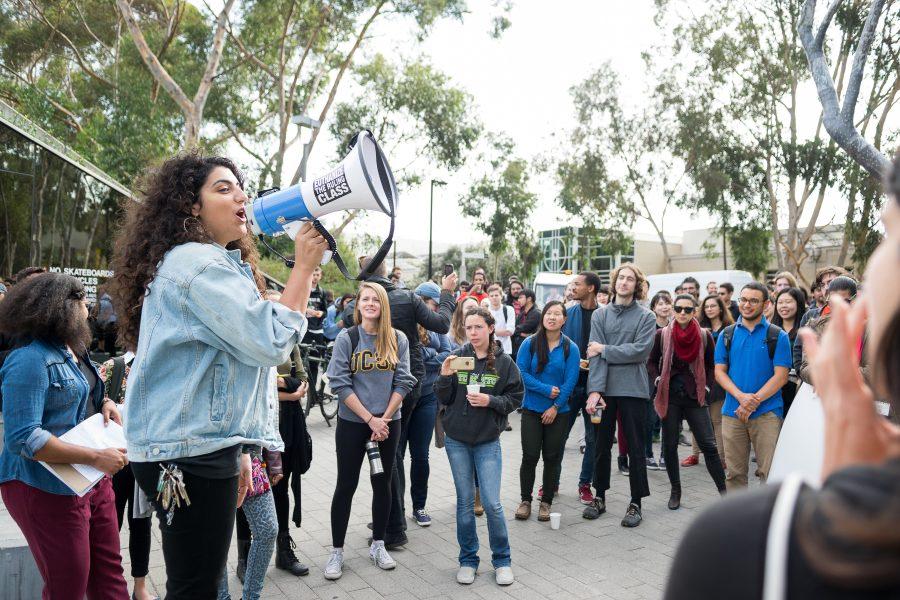The U.S. Senate narrowly passed the Republican Party’s controversial tax reform bill on Friday, which could have serious consequences for future graduate students considering that the U.S. House of Representatives’ version of the proposal contains provisions that might dissuade students from pursuing a graduate degree. While the final version of the bill has yet to be decided on, a coalition of advocates at UC San Diego is working to combat the potentially negative effects the bill might have on students seeking to further their higher education.
The Senate’s version of the bill marks the latest development in a series of widely contested provisions. The earlier House version contained policies that would directly impact college students’ ability to finance their education.
Major items under debate in the proposal, which will be voted on again once the House’s and the Senate’s versions of the plan are reconciled in one final bill, include the taxing of tuition fees and the elimination of tax deductions. Tuition waivers would count as taxable income and students would no longer be able to deduct the accruing interest rates from student loans when filing taxes.
Different groups and leaders at UCSD are also speaking out against the tax proposal.
This past Wednesday the UC Student-Workers Union (UAW Local 2865) held a graduate student walk-out on Library Walk in protest of the bill’s effects on students, where the prompt, “As a student worker I (we) …” appeared throughout photographs of students on social media documenting the event.
Graduate student in the Physics department Angela Berti and the Stewards of the Student-Workers Union collectively commented on the importance of demonstrating opposition to the bill.
“These changes would make higher education inaccessible for all but the most financially privileged and particularly affect international students and students historically underrepresented in higher education,” the Stewards told the UCSD Guardian. “Further, international and out-of-state students pay approximately double the tuition of in-state students and the amount of tax owed could be proportionally greater.”
Among the most severe changes is the removal of Section 117d of the tax code which would repeal tuition and fee waivers for graduate students, making them count as taxable income.
Kimberly McCabe, the vice president of external affairs for the UCSD Graduate Student Association explained this process to the Guardian.
“A graduate student is never receiving this money,” McCabe said. “Most graduate students receive tuition waivers in exchange for doing TAships or research programs, so they would receive a waiver for teaching a class at 10 hours a week, and then you would receive a small stipend in addition to that.”
McCabe noted that graduate students already jump through financial hurdles with stipends ranging from about $13,000 to $33,000 per year. Under the new tax plan, waived tuition fees would be included with the stipend as taxable income; for example, if a student receives a $13,000 stipend and a $16,500 tuition waiver, they will be taxed like they’re being paid $29,500.
Doctoral students would bear the heaviest toll because they spend the bulk of their time conducting research and not in classrooms, McCabe explained.
Overall, McCabe believes that the tax plan will only further restrict access to higher education.
“It’s a disaster,” she said. “It’s untenable, and what it will do, the direct consequence of that is people will not be able to go to graduate school unless they’re already independently wealthy. And that’s not the way that education should be run. Education has been said to be an equalizer, something that can help level the playing field.”
However, McCabe asserted that with the most detrimental aspects being excluded from the bill’s version passed in the Senate, the GSA will remain vigilant and is “cautiously optimistic” on how dissenting popular opinion and political engagement will resonate within the bill’s final version.
According to Dean of the UCSD Graduate Division Kit Pogliano, the university is exploring options for helping graduate students should the bill pass with the provisions that affect them.
“Fiscal reality makes it unclear if the campus will be able to mitigate the impact of changes in
the tax code.” Pogliano told the Guardian. “So I hope that it will not become necessary.”
Pogliano also spoke out on the University of California’s efforts to propelling a UC Advocacy Network call-to-action campaign around tax reform.
“It is critically important to get the message to Congress,” Pogliano noted. “Graduate students represent our future leaders and the professionals that will take our country forward. This bill would make graduate education less affordable, reducing the number of students who can attend graduate school, and ultimately serve the
community.”
Continuing their efforts against the tax plan, GSA will be holding phone banks for graduate students to lobby their local representatives on Dec. 6. Located in the GSA office on the fourth floor of Price Center, they will be providing call scripts, training for first-time callers, and statistics about the impacts of this bill on UC students.








